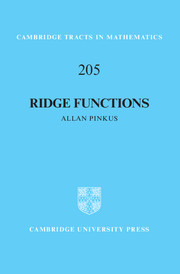Book contents
- Frontmatter
- Contents
- Preface
- Glossary of Selected Symbols
- 1 Introduction
- 2 Smoothness
- 3 Uniqueness
- 4 Identifying Functions and Directions
- 5 Polynomial Ridge Functions
- 6 Density and Representation
- 7 Closure
- 8 Existence and Characterization of Best Approximations
- 9 Approximation Algorithms
- 10 Integral Representations
- 11 Interpolation at Points
- 12 Interpolation on Lines
- References
- Supplemental References
- Author Index
- Subject Index
5 - Polynomial Ridge Functions
Published online by Cambridge University Press: 05 August 2015
- Frontmatter
- Contents
- Preface
- Glossary of Selected Symbols
- 1 Introduction
- 2 Smoothness
- 3 Uniqueness
- 4 Identifying Functions and Directions
- 5 Polynomial Ridge Functions
- 6 Density and Representation
- 7 Closure
- 8 Existence and Characterization of Best Approximations
- 9 Approximation Algorithms
- 10 Integral Representations
- 11 Interpolation at Points
- 12 Interpolation on Lines
- References
- Supplemental References
- Author Index
- Subject Index
Summary
In this chapter we consider ridge functions that are algebraic polynomials. While some of the material detailed here is a consequence of more general results, we also present results that are particular to polynomials. We start with a review of some of the basic notions. In Section 5.1 we consider homogeneous polynomials and present results on spanning, linear independence and interpolation by linear combinations of the (a · x)m for fixed m ∊ Z+, as we vary over a subset Ω of directions in Rn. In Section 5.2 we translate many of these results to the space of algebraic polynomials. Section 5.3 is concerned with what is called Waring's Problem for real polynomials (real linear forms). We consider the minimal number of linear combinations of ridge polynomials needed to represent any algebraic or homogeneous polynomial. Finally, in Section 5.4 we discuss generalized ridge functions that are polynomials. That is, we consider linear combinations of functions of the form p(Ax), where the A are fixed d × n matrices, and the p are d-variate polynomials.
Homogeneous Polynomials
As a matter of convenience we will, for a fixed direction a ∊ Rn\{0} and univariate polynomial p of degree m, term p(a · x) a ridge polynomial of degree m with direction a, and the polynomial (a · x)m will be called a ridge monomial of degree m with direction a.
For a given set Ω ⊆ Rn let
L(Ω) := {ƛa : a ∊ Ω, ƛ ∊ R}.
The set of ridge polynomials with direction a is the same as the set of ridge polynomials with direction ƛa for any ƛ ∊ R, ƛ ≠ 0. Thus L(Ω) is the set of directions we should or could be considering.
That is, P(Ω) is the set of all polynomials that vanish on L(Ω). Note that a homogeneous polynomial vanishes on L(Ω) if and only if it vanishes on Ω.
- Type
- Chapter
- Information
- Ridge Functions , pp. 36 - 59Publisher: Cambridge University PressPrint publication year: 2015

